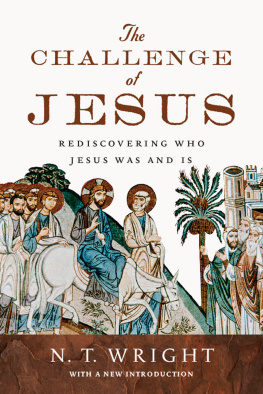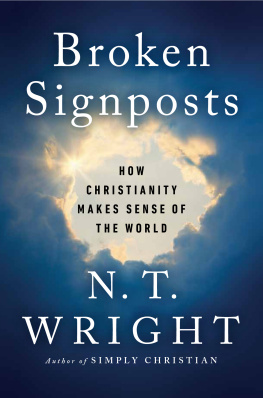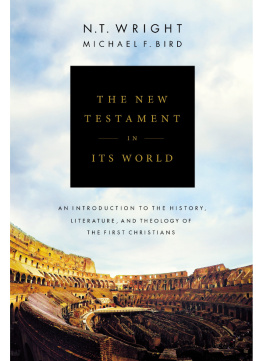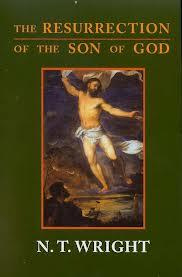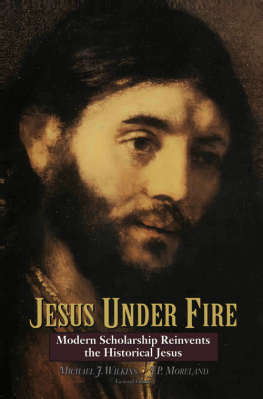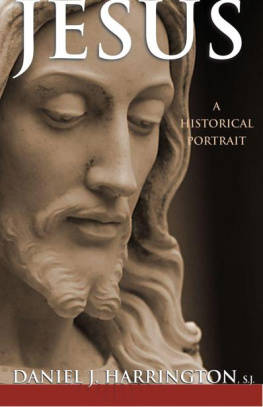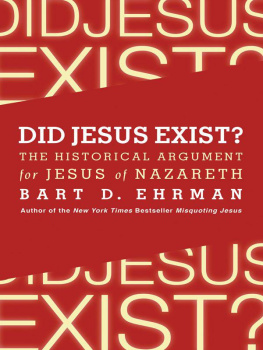The
CHALLENGE
of
JESUS
REDISCOVERING WHO
JESUS WAS AND IS
N. T. WRIGHT
InterVarsity Press
P.O. Box 1400, Downers Grove, IL 60515-1426
World Wide Web: www.ivpress.com
E. mail:
1999 by N. T. Wright
Introduction 2015 by N. T. Wright
All rights reserved. No part of this book may be reproduced in any form without written permission from InterVarsity Press.
InterVarsity Press is the book-publishing division of InterVarsity Christian Fellowship/USA, a movement of students and faculty active on campus at hundreds of universities, colleges and schools of nursing in the United States of America, and a member movement of the International Fellowship of Evangelical Students. For information about local and regional activities, write Public Relations Dept., InterVarsity Christian Fellowship/USA, 6400 Schroeder Rd., P.O. Box 7895, Madison, WI 53707-7895, or visit the IVCF website at .
All Scripture quotations, unless otherwise indicated, are the authors translation.
Cover design: Cindy Kiple
Images: Jesus entry into Jerusalem. Mosaic. Palace of the Normans. Palermo, Sicily./Photo Tarker/ Bridgeman Images
ISBN 978-0-8308-9913-5 (digital)
ISBN 978-0-8308-3696-3 (print)
This digital document has been produced by Nord Compo.
For Simon Kingston
Friend & publisher
INTRODUCTION TO
THIS EDITION
J ESUS CONTINUES TO CHALLENGE US ALL IN VARIOUS WAYS. When I wrote the original lectures on which this book is based, in something of a hurry for the conference in January 1999, I never imagined the twists and turns that would be taken in the scholarly world, in the popular Christian world and in the wider world of the dangerous twenty-first century that was about to dawn. I remain convinced that the picture I sketched of Jesus, and of the challenge he presents to those who follow him in todays world, makes good sense historically, theologically and practically. But new things have happened. In the world of scholarship, things have not stood still. Though I have been working in other areas in the life of the church and the study of Paulthree areas of continuing discussion have nonetheless caught my eye.
First, the Temple. When I began research, nobody much was talking about the Temple in relation to Jesus. Geza Vermes, in his famous Jesus the Jew, did not think Jesus Temple action merited much attention. Ed Sanders changed all that in his Jesus and Judaism, making the same incident central; but even Sanders did not, it seems, appreciate just how extraordinary Jesus claims actually were. The Temple, after all, was supposedly the place where heaven and earth met and did business. For many modern Christians, the Temple has appeared as simply a rather grand churchlike structure: a place of worship, but not really the microcosm, the little world in which heaven and earth were contained in a tiny space. Since that is the language Christians often use about incarnation, we should perhaps pay more attention to Jesus engagement with the Temple, and his implicit claim to upstage or even replace it, in terms of his implicit claim about himself. Of course, the early Christians continued to meet and worship in the Jerusalem Temple. It was not, so to speak, a straight swap. But by Pauls day they already thought of their new movement (as Qumran had done before them) as in some sense a new Temple.
The second theme I have continued to explore relates closely to this. In Jesus and the Victory of God, and then briefly in The Challenge of Jesus, I suggested that one way to grasp Jesus self-understanding was in terms of the ancient Jewish belief that Israels God, YHWH, had long promised to return in glorious presence to Jerusalem, and indeed to the Temple. Nowhere in second-Temple literature do we find anyone saying that this had in fact happened. The Gospels, however, frame their story of Jesus in exactly that way. Mark opens with quotations from Malachi and Isaiah that are explicitly about getting ready for YHWHs return. Johns prologue climaxes with a verse that resonates with the coming of the divine glory into the Tabernacle in Exodus 40, into Solomons Temple in 1 Kings 8, and into the prophesied new Temple in Ezekiel 43. The more I have studied this theme the more I have come to think that it is central to most, if not all, New Testament christology; I think it was central to the understanding of Jesus himself.
Two comments about this are in order. First, one still meets the old sneer that Jesus talked about God, but the church talked about Jesusas though this somehow meant that Jesus would have been horrified to hear the strange things his followers would go on to say about him. But this misses the point. Jesus regularly talked about God, about the Father, about Gods kingdom precisely in order to explain what he himself was doing and why he was doing it. He really did believe that he was launching the long-awaited kingdom of God on earth as in heaven. And he really did believe it would cost him his life.
Second, however, this does not make me fall back into the opposite idea that one still meets, that Jesus simply walked around knowing he was divine. If there is a danger of a modern Ebionite viewJesus just as a very good human beingthere is also a danger of modern Docetism, where Jesus was so divine that he only seemed to be human but wasnt really so. Here, of course, we have to be careful. I have argued that Jesus went about doing what he did and saying what he said because he really did believe that it was his vocation to embody the healing, rescuing, judging, life-giving and wisdom-bringing arrival of Israels long-awaited God. My point is about the sort of knowledge this seems to have been. The scenes in Gethsemane, and on the crossnot to mention the temptation after Jesus baptism and its dangerous repetition by Peter at Caesarea Philippiindicate that Jesus awareness of his vocation was just that, a faith-awareness, liable to testing, to challenge and even to doubt. That doesnt mean it wasnt real or that it wasnt true.
Perhaps I should say that I have a high view of the faith-awareness of vocation. I have been privileged to work with many people as they have wrestled with Gods call on their lives. Often what they say is, I believe that God has called me. It is then the churchs task, receiving their ministry, to declare that Gods people recognize and know the truth of that vocation. That is only a partial analogy, of course, but I hope it may be helpful. This discussion ought at least to remind us that we do not know very clearly who God is until we look at Jesus. Too often the church has assumed it knows exactly who God is (perhaps the high, detached divinity of Deism?), and then has projected onto Jesus a view of what that god might look like if he were to become incarnate. According to the New Testament, we find out about God by looking at Jesus, not the other way around.
One of the problems with the standard or orthodox view (that the main thing about Jesus is that he knew he was divine and wanted to communicate and demonstrate this to people) is that it can all too easily obscure what this embodied God of Israel came to do. It is possible to look at Jesus and say, Oh yes, hes divine, and assume that this makes one a sound Christian, ready and waiting to go to heaven. But the point of Jesus divinity is that Jesus really was launching Gods kingdom on earth as in heaven. I have now come to see it like this: the divinity of Jesus is the key in which the music is set, but it is not the tune that is being played. The tune is the kingdom of God.

